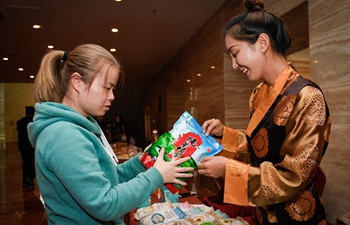KUNMING, Aug. 8 (Xinhua) -- Chinese researchers have found that substances used in tea may be useful to speed up skin wound recovery in diabetic patients.
Sheng Jun, president of Yunnan Agricultural University, led a group of researchers to use epigallocatechin gallate (EGCG), a substance commonly found in tea, to help wound healing in mice.
The recovery rate of mice using EGCG was 18 percent higher than those not using the substance. It has proven useful in reducing the inflammation response of diabetic mice, by targeting the Notch signaling pathway, he said.
China has over 100 million diabetic patients. Delayed wound healing is one of the most prominent clinical manifestations of diabetes and lacks satisfactory treatment options, he said.
The findings provide insight into the therapeutic strategy for diabetic wounds and recommend EGCG as a potential medicine to treat chronic wounds, he added.
The research findings were published in the Federation of American Societies for Experimental Biology Journal.
















